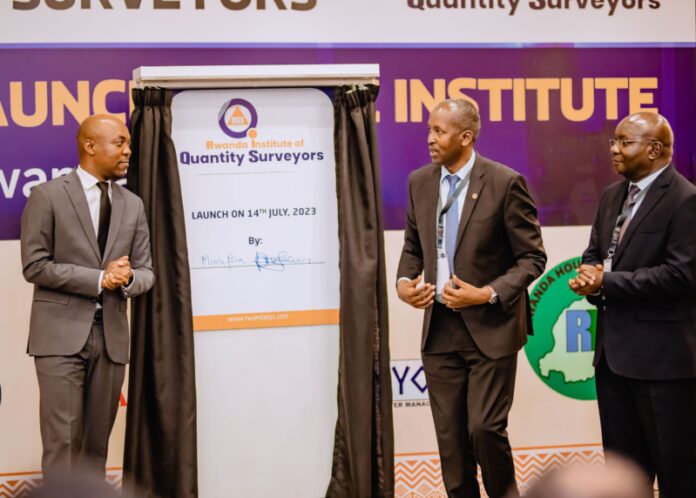On July 14th 2023, the Ministry of Infrastructure successfully launched the Institute of Quantity Surveyors in Rwanda (RIQS) which will enable the government to properly implement construction projects and account for value for money.
The newly launched institution becomes the youngest institution in the East African region where other member states, particularly Kenya, Uganda and Tanzania who have already established institutions for over 40 years.
The establishment of the institution was also preceded by the first RIQS general assembly in Rwanda in which the council members were elected to be led by QS Charles Lugira as the Chairman, and QS Frederick Nyaminani as the vice-Chairman.
Dr. Ernest Nsabimana, the Minister of Infrastructure, said that quantity surveyors play a crucial role in shaping the landscape of Rwanda’s growing construction sector and can never be underestimated especially when it comes to value for money.
Quantity Surveyors are the financial custodians and the master strategists of contract management who ensure the successful delivery of construction projects while maintaining cost-effectiveness and quality standards,” Dr. Nsabimana said.
“Your expertise is vital in safeguarding our infrastructure investments and driving the sustainable development agenda across Rwanda and the continent as a whole,” he added.
Quantity Surveying (QS) is a professional career of experts who estimate and control costs for large construction projects and by legalizing their activities in Rwanda, the institute will remove the chaos in Rwanda’s growing construction sector where other professionals in the construction sector especially engineers, and architects have been assuming the QS jobs.
The establishment of the Rwanda Institute of Quantity Surveyors comes at an opportune moment when the construction industry is experiencing rapid growth and development. With ambitious infrastructure projects and burgeoning urbanization, the demand for quantity surveyors has never been greater.
Nsabimana said that its establishment signifies a transformative leap in efforts to enhance professionalism and standardization in the construction industry and called on QS to take its rightful place in the sector.
RIQS Chairman Charles Lugira said that the institute will have a mandate to promote excellence, standardization, and ethical practices, but also most importantly to let the quantity surveyors claim their rightful position in the sector.
Lugira revealed that by 2025, RIQS plans to have more than 500 quantity surveyors and is banking on recruiting young talents, especially graduates from the University of Rwanda and other higher learning institutions.
Haruna Twaha, Audit Director at the Office of the Auditor General (OAG) said that the establishment of a QS institute will enable the AG to do a good audit job but also address the issue of chaos in the sector where engineers and architects have been doing QS job while they are not qualified.
Clients like Real Contractors, a Crystal Ventures company, welcomed the establishment of the institute saying that they will be able to provide better services with professional QS in their projects. –
Fred Bugingo, the Managing Director of Real Contractors said it’s only when you embrace the QS that the construction sector begins to thrive.
“As consumers, we are demanding the need for them to be ethical and due care because they hold precious information about clients and secrets of companies and the future of the sector and government. This institute means our prayers are answered and now we can hold them accountable,” Bugingo said.
Victor B.O Odongo – Africa Association of Quantity Surveyors (AAQS) VP East African region said that they want Rwanda to aggressively pursue this profession and will be supported to grow despite the challenges that face the regional practices in QS.
Some main challenges in regional practice include EAC protocols not aligned with national laws in member states, differences in national and professional regulatory laws, use of multiple forms of contract in the region, specifications and standard methods of measurement, taxation laws & repatriation of earnings.



